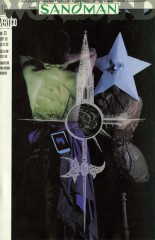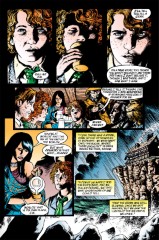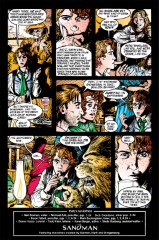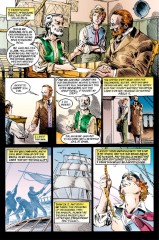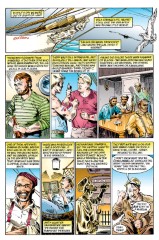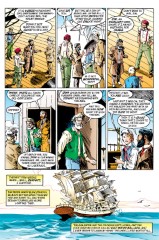Issue 53: "Hob's Leviathan"
Neil Gaiman, Michael Zulli, Dick Giordano, Bryan Talbot, Mark Buckingham
- Third story in anthology, Worlds' End
- Third story reprinted in trade paperback Worlds' End
- Audible Act III Chapter 16
Cover: Note the photograph in the lower left, which was used in the cover to issue #51. The covers to "Worlds' End" are nested and inter- relate, just as the stories do.
Page 1#
Panel 1
This is not the same person who brought Brant the stew in 51:9: the neckerchief is green instead of red, and there is no beard stubble.
Call me Jim: An allusion to the opening line of Herman Melville's Moby-Dick, "Call me Ishmael"; possibly combined with Joseph Conrad's Lord Jim.
Page 2#
Panel 1
The great ship: Seems to be a reference to a legend about an exceptionally large trading ship. See this 2015 post on exoterx
Mother Carey: A supernatural personification of the cruel and threatening seas, An Anglicization of the Latin "Mater Cara", an epithet of the Virgin Mary. (wikipedia)
Panel 6
The title is a pun on the English philosopher Thomas Hobbes (1588-1679), whose best-known work was called Leviathan.
Leviathan: A great sea monster referred to in the Bible; see for instance Isaiah 27:1.
Page 5#
Panel 1
Hob Gadling has appeared before, in issues 13 and 22.
Page 6#
Panel 3
Note the tattoos...
Page 9#
Panel 7
Salt Water Ballads: By the English poet John Masefield (1878-1967); first published in 1902.
Page 10#
Panel 5-6
Rhyming slang.
"Khyber [Pass]" -- "Ass".
"Apples and Pears" -- "stairs".
Page 11#
Panel 4
Note the resemblance between this king and the stow- away. The story itself is apparently an old Indian folk tale.
Page 13#
Panel 4
Rukh: More familiarly rendered as the Roc of Madagascar. From "The Second Voyage of Sinbad the Sailor".
Page 14#
Panel 3
The poem is called "Golden Road to Samarkand", by James Elroy Flecker, a scene from his verse play, Hassan. Jim is quoting the end of the poem.
Page 22#
Panel 3
It's clear that the stowaway is an immortal. If this is indeed the king from the tale, then he very likely has a perfect right to call Hob Gadling "young".
Page 23#
Panel 3
In the Kindly Ones arc (#59:8.1), Hob Gadling mentions a previous wife of his called Peggy. Could "Jim" be the same person he mentions?
Page 24#
Panel 2
There is a sea-ballad called "The Handsome Cabin Boy". Kate Bush has recorded it, among others.
Credits
- Greg "elmo" Morrow (morrow@physics.rice.edu) created the Sandman Annotations and forwarded much useful information regarding "Worlds' End".
- He also caught "Call me Jim" and identified the rhyming slang.
- Originally collated and edited by David Goldfarb.
- Lance "Squiddie" Smith (lsmith@cs.umn.edu) noted the relationships between the covers.
- Abhijit Khale (Abhijit_Khale@transarc.com) identified the Indian story.
- Timothy Hock Seng Tan for the reference to Peggy
- Ralf Hildebrandt added more details.
- Richard Munn added the Mother Carey reference, and updated the Samarkand reference.
Last modified by Richard Munn on 2023-09-14 - Added some references
[edit this page] [page history]
